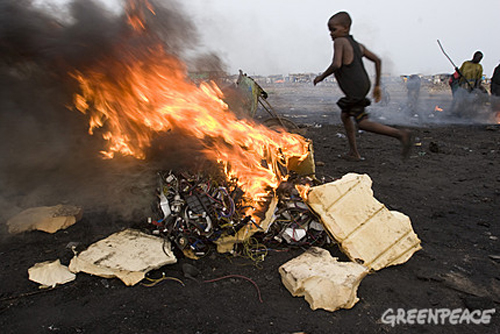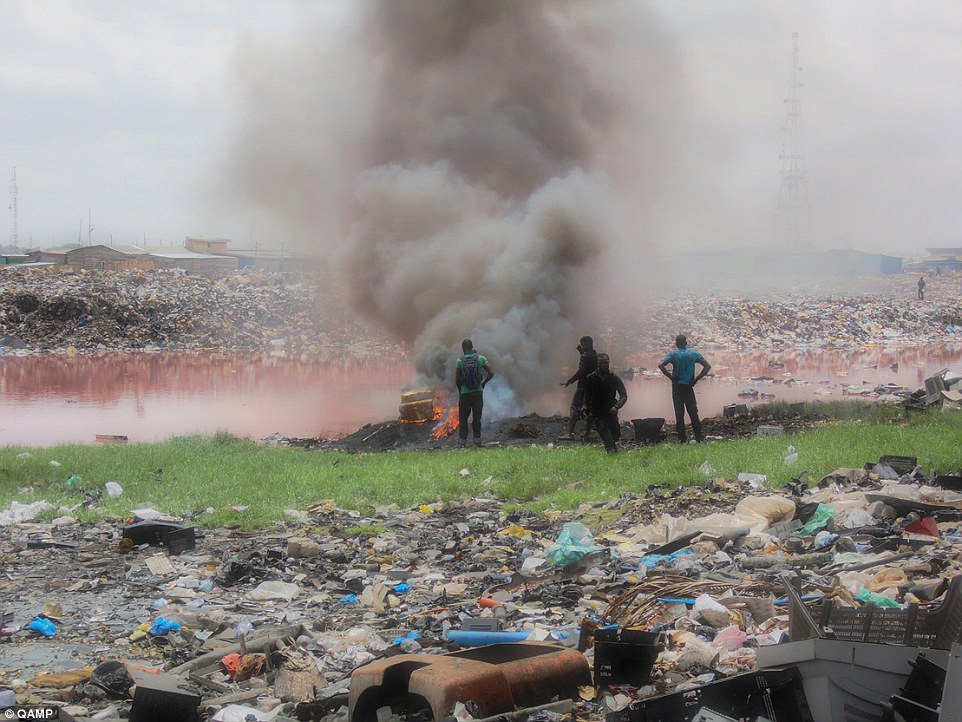What happens to computers when they are sent to Africa?
There is no hiding from the fact that the disposal of your old computers does cost money!
Why?
Your old computers contain a high amount of toxic material that needs to be recycled properly, your old computers also contain a large amount of personal and corporate data that can be used by criminals – this needs to be fully deleted.
We know this and yet still thousands of computers end up in Africa.
Take this article written by Josie Ensor of the Daily Telegraph
“The bosses of a string of companies which posed as legitimate waste disposal firms are now facing jail for sending computers from council dumps and high street stores to Nigeria.
Many of the computers would have contained sensitive personal and business data, while working computers belonging to the Ministry of Defence were also discovered in one container.
It raises fears that information on computer hard drives could have been harvested by fraudsters in Nigeria, widely known as a centre for internet crime.
The details emerged following an investigation by the Environment Agency, codenamed Operation Boron, into firms that had been sending waste to developing countries.
A three-year probe revealed ten firms operating across England were being paid to recycle electrical equipment from council recycling sites, retailers and other businesses but instead shipping them to Africa where they were simply dumped”.
Some companies choose to send computers to Africa because it saves them money but some use companies, that as the article above describes, send the computers to Africa to generate illegal profits.
So what is so bad about send computers to Africa?
Take a look at this report by Jay Akbar of the Daily mail.
“Harrowing images reveal one of west-Africa’s vast electronic graveyards where ‘millions of tonnes’ of discarded appliances from all over the world – including the UK – are being dumped every year.
Thousands of broken televisions, computers, microwaves and refrigerators are being illegally exported to African countries and dumped gigantic landfills like Agbogbloshie in Ghana because it costs less than recycling them in their countries of origin, campaigners claim.
41 million tonnes of ‘e-waste’ worth over £34 billion were discarded globally in 2014, according to a shocking report by United Nations University who claim only 6 million tonnes of that was recycled properly”.
The Picture above says it all and is without question sickening, hundreds of children trawl through millions of tons of our toxic waste looking for precious metals. most will live very short lives.
In the UK we follow the European WEEE directive which states that you MUST KNOW where your e-waste is going!
You cannot simply pay to have someone collect it and dispose of it without you knowing exactly what has happened to it. However the trade in illegal electronic waste is still big business.
In fact INTERPOL estimates the average value of a ton of WEEE at around US$500. Putting the value of the illegal trade in WEEE at between $12 and $19 billion US Dollars. While there is an initial cost to collect and process WEEE properly, there is still a significant residual value in the properly separated recovered materials. It is people and organisations trying to sidestep this initial cost that has created the problem…is that you?
Be assured that the Government back by Interpol and the European Union are cracking down on companies large and small, you will need to show a complete paper trail as to who collected your computers and what they have done with it. Your responsibility does not end at the point the computer leaves your building,
Companies Such as Secure Data Recycling will of course provide you with a Waste Transfer Note and certification of Destruction but can also provide a complete report of when the computer was collected, how the data was destroyed, if it was resold or if it was recycled.
Using processes based here in the UK, you as an organisation can rest assured you will never fall foul of the heavy fines that can follow mismanagement of the Waste of Electrical and Electronic devices.
Maybe you say that “it cannot happen to me and we will never be caught”
Well it can, just take a look at this article from Waste Management World
Recycling experts are predicting a dramatic increase in the number of fines for UK firms after a Birmingham company became the first to fall foul of new e-waste laws.
Hairdressing supplies wholesaler Aston and Fincher Ltd pleaded guilty to 31 charges relating to failure to comply with packaging waste regulations and failing to register as a producer of electrical and electronic waste
By failing to comply with the packaging regulations, the company avoided paying approximately £10,900 ($16,800). By failing to comply with the Electrical and Electronic Equipment (WEEE) Directive, the company avoided paying £445 ($690) plus unknown costs of financing the recovery and recycling of waste equipment for which they would have been responsible in 2008. This gave them an unfair competitive advantage compared to those businesses that have complied with legislation.
The charges were brought by the Environment Agency under the Producer Responsibility legislation. Aston and Fincher Ltd was fined £650 ($1000) for each offence – a total of £20,150 ($31,100). It was also ordered to pay compensation of £7,135 ($11,000) to the Environment Agency for loss of registration fees, costs of £3,605.11 ($5670) and a victim surcharge of £15 ($23).
So the case against sending computers to Africa is building
- There is the moral standpoint
- There is the financial standpoint in fines
- There is the issue of bad publicity, do you want your company known as the company that deliberately send electronic waste to Africa to save money?
Finally and not yet covered in this article is the issue of IDENTITY FRAUD
A criminal needs very little to create a new identity and some banks in Africa DO NOT have the fail-safes created by banks in the UK.
In Nigeria for example, identity theft is big business and they use any small piece of data to help convince your that their scam is genuine.
Perhaps from an old computer they get your telephone number, your name and date of birth and address. So what can they do with that?
They call you and state that they are with a main high street bank, but before they can divulge information they need to ask you some security questions.
- What is your full name
- DOB
- The first line of your address
Now you are drawn in, they seem convincing as they know information about you and so the scam begins.
By sending computers to Africa you are simply opening the door to criminals.
You have a responsibility to your staff, clients or even patients to ensure that their data is destroyed by a company such as Secure Data Recycling who offer you a complete paper trail showing exactly how and when your old data has been destroyed.
How are you going to get that sort of information from a company illegally sending the computers to Africa.
You may well get paperwork BUT is it real!
Thanks to the Data Protection Act 1998, your company is responsible for the proper handling of confidential data, ensuring that it is both stored and (where necessary) destroyed correctly. Under the law (Section 55A), companies can be fined up to half a million pounds sterling for breach of this responsibility.
So it’s important to know your obligations and ensure that your company complies with them.
So our final question..
Do you still think sending your old computers and IT equipment to Africa is a good idea?



